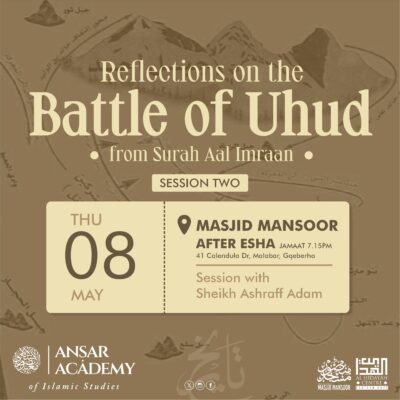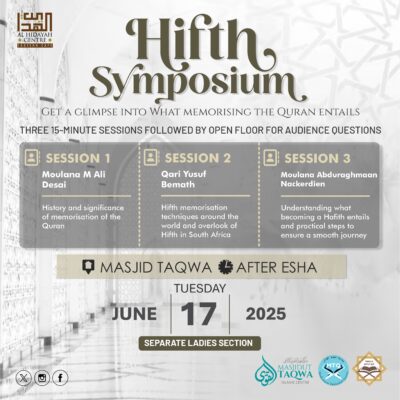Among the early Muslim immigrants to South Africa there may have been Huffaaz, as some were trained Islamic teachers.
It is highly probable that individuals like Sheikh Yusuf of Macassar and some scholars exiled to the Cape with him in 1694 had also memorised the Qur’aan, because such memorisation was a characteristic feature of Muslim scholarship of the time.
In 1705, the Rajah of Tambora (Sultan Abdul Basi) wrote a copy of the Qur’aan from memory. Imam Abdullah (Tuan Guru) also wrote a copy of the Qur’aan from memory. He had a number of contemporaries who memorised the Qur’aan, including Imam Rajab van Boeghies, who also wrote several copies of the Qur’aan from memory, and Khalib Hajji, founder Imam of the Shafi Musjid.
Abu Bakr Effendi, a Kurd Aalim sent to the Cape by the Ottoman government, established the Ottoman Theological School in Cape Town in 1862. Students memorised the Qur’aan there within two years. Ismail Muawiyyah Manie (d. 1918) was the first locally-born Muslim to memorise the Qur’aan. He left to study Qiraat in Makkah and was awarded a medal by the Ottoman authorities for excellence in Qiraat. Many young men left to study in Ottoman Makkah after the emancipation of slaves. At the same time, many Arabs settled in Cape Town.
Sheikh Muhammad Najaar of Makkah settled in the Cape in 1906. He was a qualified Qari in the 7 modes of recitation, an extremely rare qualification in SA at the time. Imam Muawiyyah Sedick (d. 1955) of Turkish origin spent 10 years in Makkah, studying Hifz. Muhammad Salih Abadi and others who became Huffaaz under Imam Muawiyyah, owed their prominence in Hifz and their becoming the pioneers in producing Huffaaz in SA to him.
Sheikh Muhammad Salih Abadi became a Haafiz at 15 and, in 1927, left to study in Makkah. He studied Qira’atul Hafs and Warsh. Sheikh Salih returned to the Cape in 1938 with permission to teach Qira’atul Hafs. He was a pioneer in producing Huffaaz in SA, and is known as the father of Hifz in SA.
Source: Pages From Cape Muslim History, Yusuf Da Costa








COMMENTS